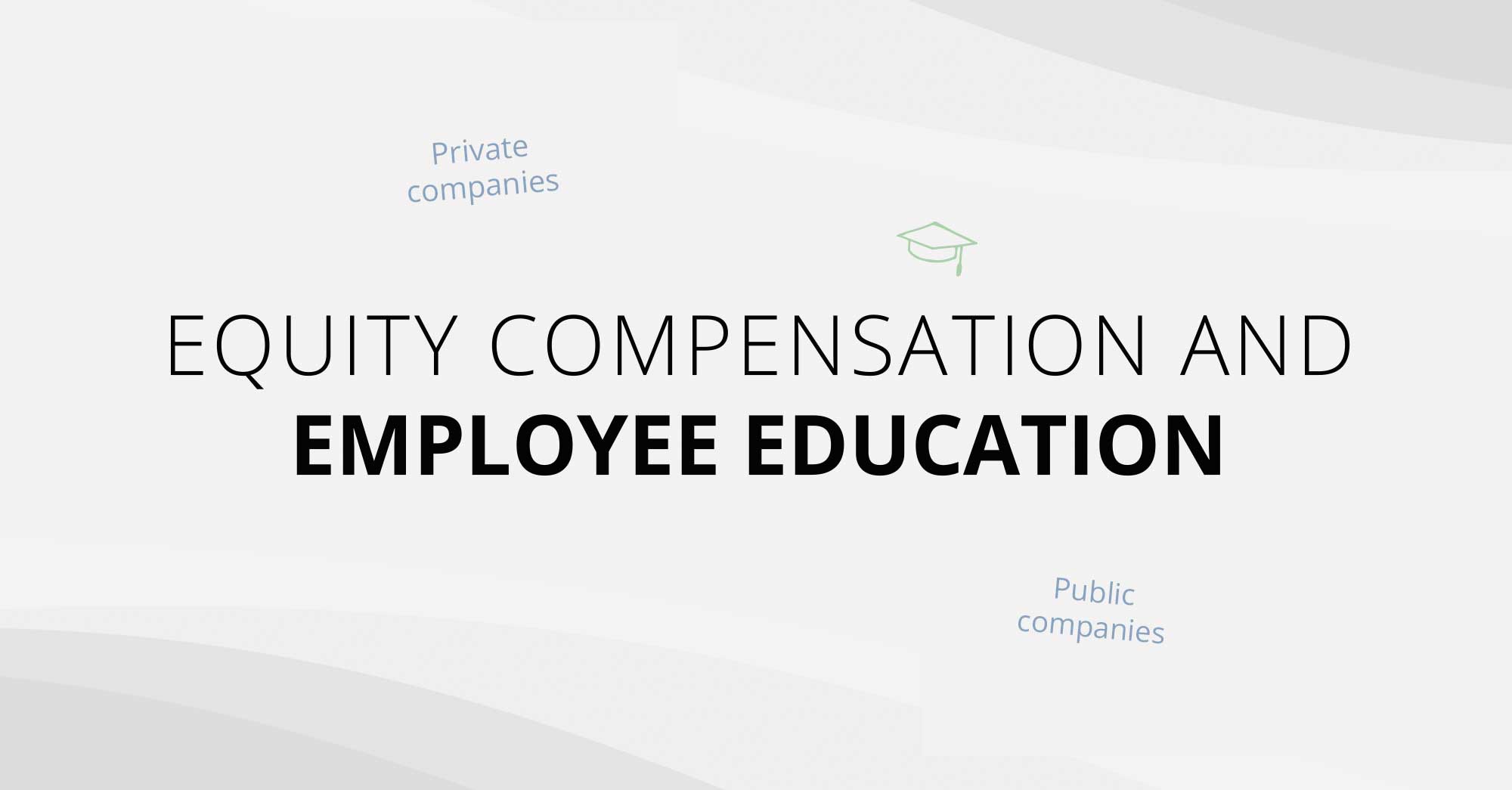Previously we looked at Why private companies should consider issuing equity compensation (and how to go about it). Much like publicly traded companies, those that have not yet had a liquidity event, such as an IPO, or where a strategic decision has been made to remain fully privately owned, can still implement employee equity plans as incentives to enhance their remuneration and benefits packages and attract, reward, retain and motivate talented individuals.
How to explain private company equity compensation to your employees
Whether you’re a private or a public company taking the time to communicate and educate your people about how equity compensation works is an important step in enhancing their overall financial wellness. Aiding and advancing their financial literacy is crucial since employee understanding will play a key part in the success or otherwise of your stock plan.
When it comes to private companies looking to offer equity compensation this is especially important as there may be pre-conceived misconceptions or a general lack of knowledge amongst your population of how these plans operate.
One of the key drivers of success for any equity compensation plan is participation rates and buy-in among employees. Having an amazing offering is of little use if your staff do not know about it, don’t understand it or don’t partake, because it will not achieve what you need it to.
Consider your audience and how best to deliver the message so that it has the highest impact on your employee base. Hanging posters or posting flyers in office locations isn’t ideal if most of your staff work remotely. Similarly sending out an e-mail blast may not be the best choice if your employees work in retail or warehouse locations where they could be without regular computer access.
Private equity is only for start-ups right? Wrong
Start-up companies granting their employees shares has long been a familiar and standard practice. In those early days employers may find the war for talent to be a fierce marketplace, with the funding or cash required to entice skilled workers not always available to use as a bargaining tool, especially when competing against more established players. Newer companies of course require quality staff so that they can achieve their goals, and offering up shares in the company provides a way to bridge this gap.
It’s not just early stage start-ups who can avail of the private secondary market though. Many companies are choosing to remain private for longer without IPOing and some of the world’s most common household names right now are not quoted on any public stock exchange.
Education is key
Inform. Educate. Inspire.
Attract. Reward. Retain.
Many people will probably be familiar with the idea that when a private company IPOs those employees with shares will often receive financial compensation. However, not every company wants this exit or liquidity event, and your employees may be either unaware of or unfamiliar with how the secondary private market works. They might even be of the mistaken belief that equity in a private company can never be sold. This is not the case.
Your employees are on the same journey as your company’s leaders and it’s not just those at the top who need to be kept informed. Consider how you communicate change at critical times. Bring equity awards to life by informing your employees what can potentially happen at each stage along your company’s journey, inspiring them as they work towards new goals.
Where is the business headed, how it’s going to get there, what’s their role in achieving this and how they might benefit from it?
Motivate them by making them see how the company’s targets align to their financial rewards.
Most people want to work for employers who look after them, treat them well and that they can be proud to say they work for. Through an equity compensation offering your employees technically become shareholders in the business, so you will want to be as open with them as you would any other.

What about selling shares in a private company?
Don’t hold back key information.
If the shares being awarded to your employees are subject to any restrictions, such as any clauses around timeframes before they can sell, if the company retains a Right Of First Refusal (ROFR) clause or if employees are required to sell or forfeit their shares back to the company rather than another Third Party upon leaving, these should be disclosed upfront in a clear, precise manner.
The market for privately traded stocks is far smaller than that for public ones, so there may be less liquidity or reliable pricing information available. The seller could have difficulties trying to find a purchaser happy to pay the agreed upon price or may have to use a stock broker to complete the sale. These can all have implications for people when it comes to strategizing, exercising shares and more.
Depending on the plan type and transaction there will normally be a taxable event triggered, usually when the stock is sold but not exclusively. It’s essential staff are aware of this and their obligations in relation to same.
Remember, not all of these are exclusive to private companies. Liquidity events, such as a merger, acquisition or takeover may also have an impact on stock awards, their value and liquidity.
What about cash rewards?
Following the receipt of a cash bonus what’s to stop an employee from taking their award and handing in their notice the next day? There will always be a demand for skilled staff.
Equity based incentives like stock options, which can have various tranches or expiration and exercise dates, meaning the funds don’t all become available at the same time, encourage employee retention. Staff are more likely to become invested in the performance of the company and less likely to be easily poached by competitors or motivated to leave by the promise of short term gains.
Information fuels inspiration
Tell your employees what’s in it for them. Explain what having equity in the firm actually means. Not everyone has an understanding about equity compensation, especially when it comes to that held in private companies.
How does it work? How do they benefit? What will it cost them? What do they need to do?
An informed workforce is always going to be better than an ill-informed or uneducated one. Where there is a lack of information and facts, misinformation and rumor can run riot.
When choosing your equity compensation provider consider if they can, aside from managing your plans, offer employee communications and educational materials.
What next?
Contact us to learn more about how having an equity compensation plan could benefit your company and employees and how we can assist with education and communication materials to help you get the most out of your plan.
Employee ownership, simplified. It’s what we do.
This publication contains general information only and J.P. Morgan Workplace Solutions is not, through this article, issuing any advice, be it legal, financial, tax-related, business-related, professional or other. J.P. Morgan Workplace Solutions’ Insights is not a substitute for professional advice and should not be used as such. J.P. Morgan Workplace Solutions does not assume any liability for reliance on the information provided herein.



